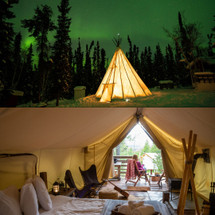May 13th 2023
The Evolution of Camping: From Survival Necessity to Glamping and Technology-Savvy Adventure
Camping has been an activity enjoyed by humans for centuries, with evidence of primitive camping sites dating back to over 12,000 years ago. Over the years, camping has evolved from a necessity for survival to a leisure activity enjoyed by people from all walks of life. As someone who has spent years camping in different settings, from tent camping to backcountry camping, I have witnessed firsthand the evolution of camping and how it has become more accessible, convenient, and enjoyable.
The origins of camping can be traced back to early human civilization, where people would set up temporary shelters in forests or near water sources to protect themselves from the elements and wildlife. This type of camping was purely a means of survival, with no regard for comfort or convenience. It was a way of life that required a great deal of skill, knowledge, and preparation.
As civilization progressed, so did the way people camped. Camping became a recreational activity in the 19th century, with wealthy Europeans traveling to remote locations for the purpose of hunting and fishing. These trips often required large amounts of gear and equipment, and the camping experience was limited to the elite. However, as the popularity of camping grew, it became more accessible to the general public.
The 20th century brought about many changes in the world of camping. The development of cars and highways made it easier for people to travel to camping destinations, and the introduction of mass-produced tents made camping more comfortable and convenient. With the advent of modern camping gear, such as sleeping bags, portable stoves, and lightweight backpacks, camping became a popular activity for outdoor enthusiasts and families alike.
In recent years, camping has continued to evolve, with new technologies and innovations making it easier and more enjoyable than ever before. One of the most significant changes has been the rise of glamping, a form of camping that combines the comforts of a luxury hotel with the great outdoors. Glamping sites offer a range of amenities, including fully-equipped tents, hot tubs, and gourmet food, making it possible for people to enjoy the beauty of nature without sacrificing comfort.
Another recent trend in camping is the use of technology to enhance the camping experience. Apps and websites now make it easier to find and book campsites, and GPS devices and other gadgets help campers navigate the wilderness and stay connected with the outside world. Solar-powered chargers and other eco-friendly devices also make it possible to enjoy the benefits of technology without damaging the environment.
Despite these modern developments, camping still requires a certain level of skill and knowledge. Experienced campers know that there is more to camping than just setting up a tent and lighting a fire. Proper planning, preparation, and knowledge of the environment are all essential for a successful camping trip. It is important to have a basic understanding of weather patterns, wildlife behavior, and camping regulations in order to stay safe and avoid damaging the environment.
As someone who has spent many years camping in different settings, I have come to appreciate the evolution of camping and the many benefits it offers. Camping provides an opportunity to disconnect from the stresses of daily life and connect with nature, and it offers a sense of freedom and adventure that is hard to find elsewhere. It is a way of exploring the natural world and discovering new places and experiences.
Camping has come a long way from its origins as a means of survival to a popular leisure activity enjoyed by millions around the world. The development of modern camping gear, the rise of glamping, and the use of technology have made camping more accessible and enjoyable than ever before. However, it is important to remember that camping still requires a certain level of skill and knowledge, and that proper planning and preparation are essential for a safe and successful trip.

